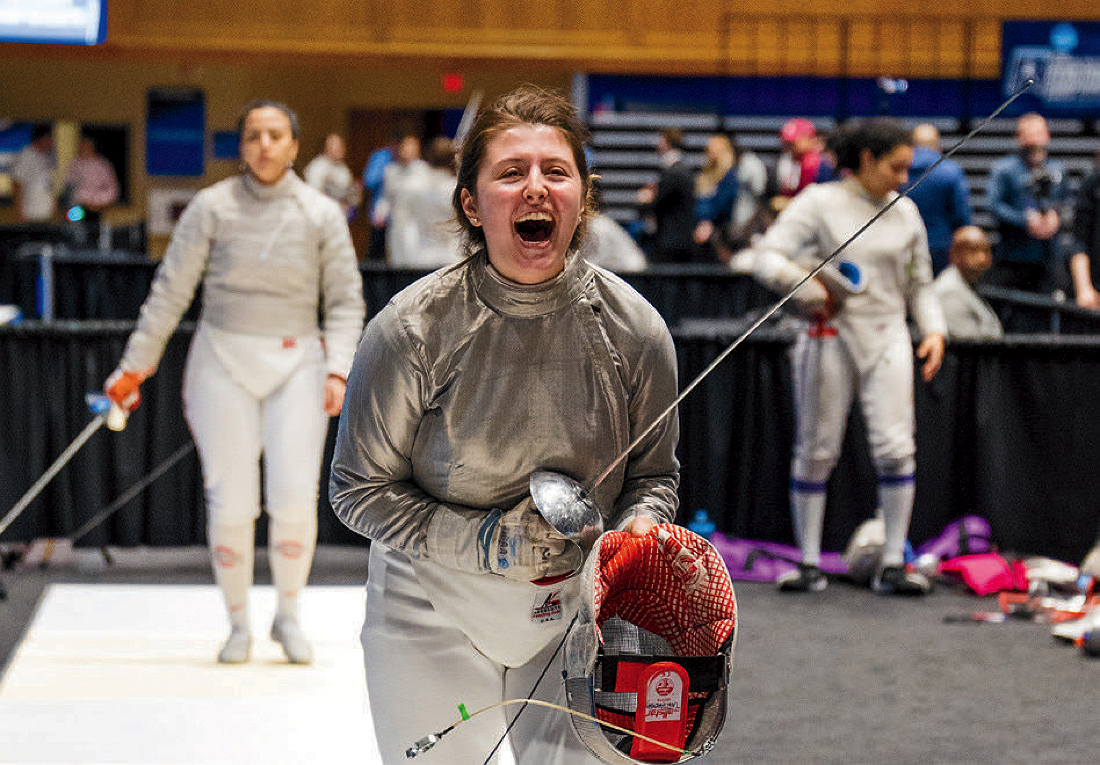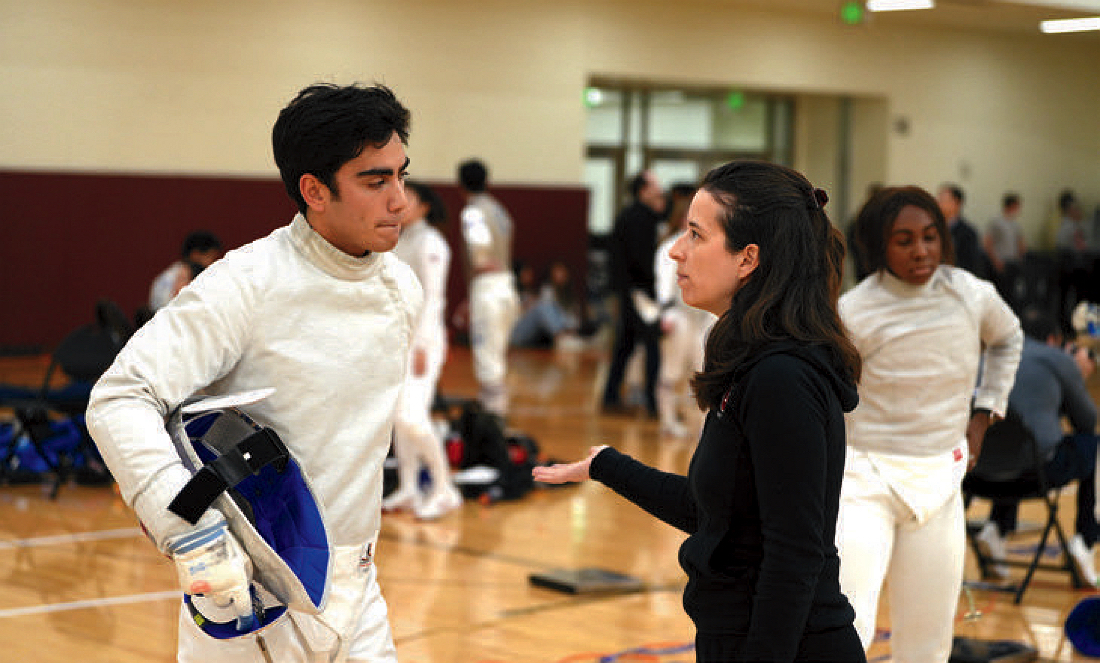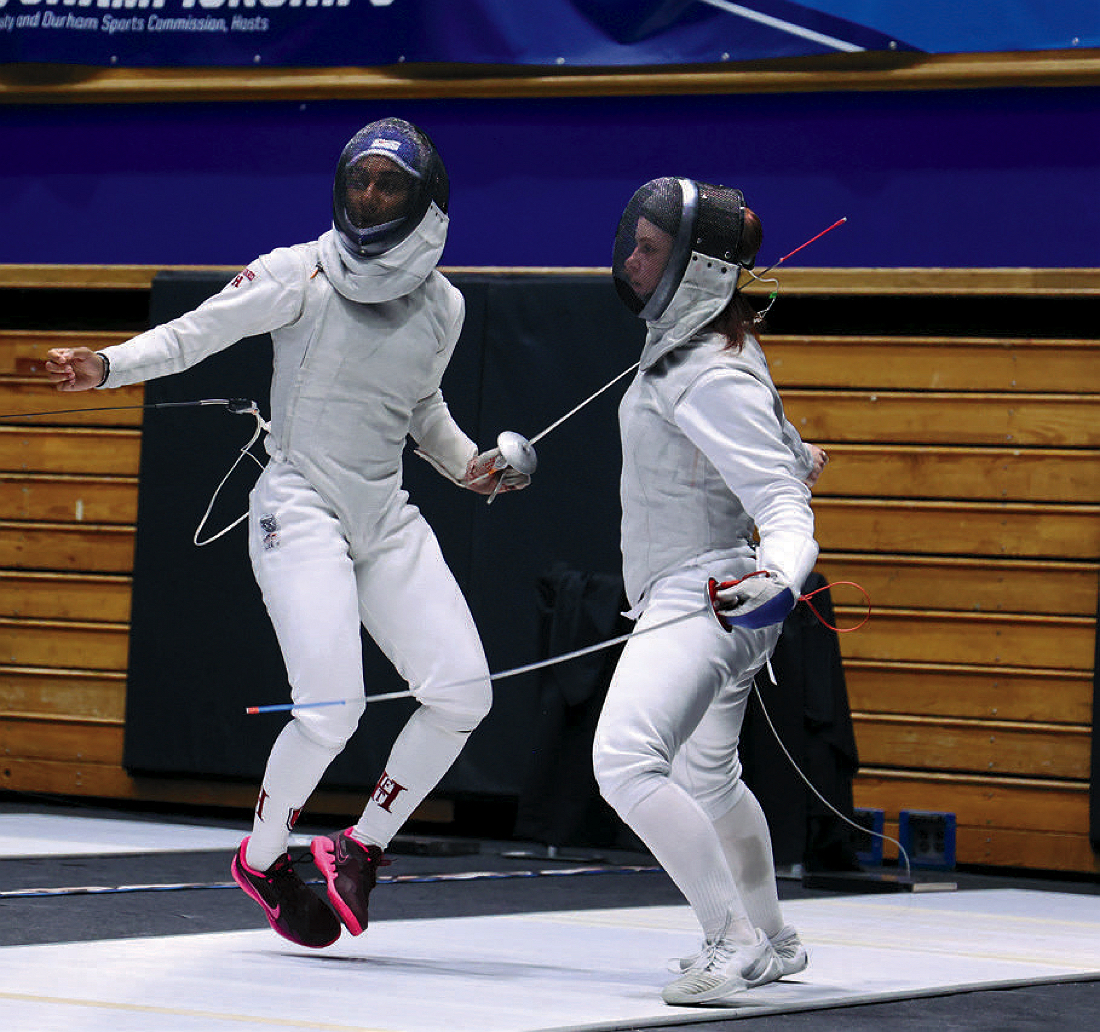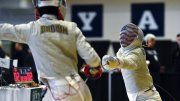To a young mind, lightsabers are mesmerizing. They buzz in the hands of Jedi masters, glowing in fluorescent colors. As a child, Mitchell Saron ’24 says he “was just obsessed with swords,” constantly begging his sister and parents to duel him with plastic lightsabers. When he was in third grade, Saron picked up a real saber and began to fence. Quickly, he was hooked, dropping other sports to become a swordsman.
This summer, Saron heads to the 2024 Olympics in Paris along with seven other Harvard fencers, a mix of incoming freshmen (Colin Heathcock ’28 and Nick Zhang ’28), current students (Jessica Guo ’27 and Lauren Scruggs ’25), and recent graduates (Eli Dershwitz ’19, Filip Dolegiewicz ’23, Saron, and Elizabeth Tartakovsky ’23). Harvard has emerged as a force in fencing in the last few years. Since the program began in 1888, Harvard has sent seven fencers to the Olympics. The 2024 cohort bests that number in a single year.

Harvard Athletic Communications
Two of those fencers have already competed at the Olympics. When Eli Dershwitz fenced for Team USA in the 2016 Rio Olympics, he demonstrated that Harvard fencers could succeed at the highest level of both collegiate and international fencing. (He fenced again at the 2020 Tokyo Olympics.) Following his graduation, he spent four years as an assistant coach, helping head coach Daria Schneider, who took the helm in 2019, build a program that prepares student-athletes for both collegiate and international competitions.
Jessica Guo describes her first Olympic experience as “interesting.” Just 15 years old, she felt “like a baby,” and leaned on her teammates for support. The Toronto native, fearing COVID, skipped Tokyo’s opening ceremony and competed in an empty stadium. This time, Guo is ready to enjoy Paris, try to win, and mentor a teammate who is younger than she.

Harvard Athletic Communications
Guo’s first year of college brought typical challenges (introductory pre-med courses, leading toward an eventual neuroscience concentration) and joys (befriending her roommates, attending formals). But her experience overall has been far from typical. To qualify for Paris—and to stay sharp after making the cut—she has traveled the globe for Olympic-style fencing tournaments. In late April, for example, she flew to Tbilisi, Georgia, for the Senior Foil World Cup. Far from Cambridge, she fenced against teammate Lauren Scruggs, defeating her on the way to a sixth-place finish.
Those international tournaments, to which many high-level fencers start traveling in their early teens, inspired Elizabeth Tartakovsky’s love of languages. Tartakovsky, who grew up in Livingston, New Jersey, spoke Russian at home. (Both of her parents were born in Ukraine and immigrated to the United States in the ’90s.) At her first international competition, early in high school, she bonded with the Russian fencers over their shared tongue. Later in high school, while at a World Cup in Segovia, Spain, some new friends on the Spanish squad convinced her to conduct a local TV interview entirely in Spanish. At Harvard, she earned a Spanish citation, alongside her economics concentration and psychology secondary. “I love how when you learn a language,” she says, “you can know the culture and the people on a deeper level.”

Harvard Athletic Communications
Scruggs, who hails from Queens, New York, has managed to carve out a normal college experience despite a robust competition schedule. After trialing several concentrations (history, government, economics), she opted for philosophy. Though fencing is a sport of mental focus, she says she does not bring lessons from her philosophy courses onto the mat.
Other Harvard fencers have embraced the mental approach. When Saron is not fencing, he says he is “journaling, meditating, and cooking.”
Each fencer takes a slightly different approach to the craft. For Tartakovsky, a saber athlete, fencing is like a physical game of chess. “Before the referee says to start, I usually have a premeditated plan,” she says. But, since saber is “really quick, and you are fencing an opponent with a real human brain, not everything goes according to plan.” In those moments of improvisation, Tartakovsky relies both on her instinct and her knowledge of her opponent’s weaknesses.
Other fencers fight more spontaneously. “I wouldn’t say I’m an over-thinker,” says Scruggs, a foil fencer. Sometimes, she has “a very vague plan, but nothing too concrete. Every time you fence someone, it’s going to be different.” Generally, she plays aggressively, preferring to attack forward rather than retreat.
Plan or no plan, fencers say that, at their best, movements come totally naturally. “When everything’s going right,” says foil fencer Guo, “I’m not thinking at all.”
Fencers generally achieve their peak performance during their late 20s or early 30s, says Dershwitz. But unlike some top European or Asian fencing programs, the United States does not have a federally funded training center. Due to limited institutional backing, fencers often enter the workforce before reaching their peak.
For some of the Harvard alumni heading to Paris, the Olympics will be their last hurrah. Tartakovsky and Saron plan to start corporate jobs in New York after the festivities, and Dershwitz has not decided whether he’ll continue to compete. But before they use the Force to generate shareholder value, they’ll have one more opportunity to be true Jedis on the mat.









